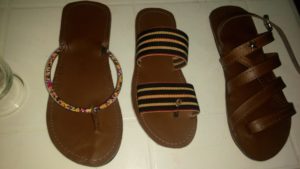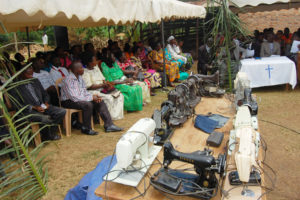Fall 2018

Nicaragua 2018: a Pause in Our Longest-running Program
Fall 2018 InGear
1. A 27-Year Partnership
By Dave Schweidenback
In the 1970s and 1980s there was a civil war in Nicaragua. Violence and destruction were widespread. The warring sides would burn the crops of their enemies, so hunger was also widespread. Many bridges and roads were impassable.
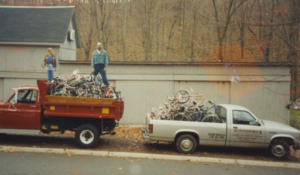
U.S. religious groups were sending humanitarian aid such as food and medical supplies to Nicaragua. A couple of these groups were in New Jersey, including a group at the United Methodist Church in Plainfield. I asked if I could put some of my bikes into the containers they were shipping to Nicaragua. That’s how our first bikes went to Nicaragua in 1991.
After a few of these containers had been shipped, the church groups invited their Nicaraguan partners to a meeting in New Jersey to talk about our projects. One of the Nicaraguans was Wilfredo Santana, head of the Association for the Community Development of Rivas, a town in southwestern Nicaragua. Wilfredo was talking to the group about his programs and the shipments from the U.S. and he said, “Forget all that other stuff, just send us bikes.” Gasps all around. The roads and bridges were in such bad shape, and gasoline was so scarce, that a bike was an incredible advantage in Nicaragua at that time.
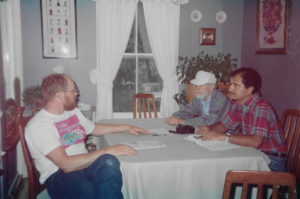 The group had a picnic where I had a chance to talk with Wilfredo. He said that he didn’t have any money for the first shipment, but that if I could ship him a container of bikes at no charge, he could make enough money on the bikes to pay for the next shipment. Each shipment would pay for the next, and this could go on indefinitely. This was the origin of what we call the revolving fund idea, which we have used ever since.
The group had a picnic where I had a chance to talk with Wilfredo. He said that he didn’t have any money for the first shipment, but that if I could ship him a container of bikes at no charge, he could make enough money on the bikes to pay for the next shipment. Each shipment would pay for the next, and this could go on indefinitely. This was the origin of what we call the revolving fund idea, which we have used ever since.
To ramp up my production and to have more control over where I sent bikes, I was determined to make P4P-only shipments, independent of the other groups that were sending aid to Nicaragua. I went to the SeaLand shipping company and told them that if they would donate the cost of the first shipment, I would become a long-term customer. They made the shipment at no charge and I became a long-term customer. Since then, it has sometimes been a struggle to fund the first shipment to a new partner. But we’re still in business, we’ve shipped more than 155,000 bikes, and we’re still using our revolving funds to pay most of our international shipping costs.
End of an Era
There are several reasons a program might end: the local market for bikes can become saturated; the business might not be well run or might lose key people; the government might impose prohibitive import rules or fees; the local economy might collapse. Despite all these unhappy possibilities, our P4P program in Nicaragua has had an amazing run.
Between 1992 and 2016, we sent more than 40,000 bicycles to Nicaragua, including more than 20,000 to Rivas. Now seems like a good time to pause the program. Demand for our bikes is down because we’ve shipped so many and because of the terrible political and economic times in Nicaragua in 2018.
Given the right circumstances, we may revive the EcoBici program down the road. For now, though, we’re making the Rivas program inactive. Goodbye for now and good luck to our good friends in Nicaragua.
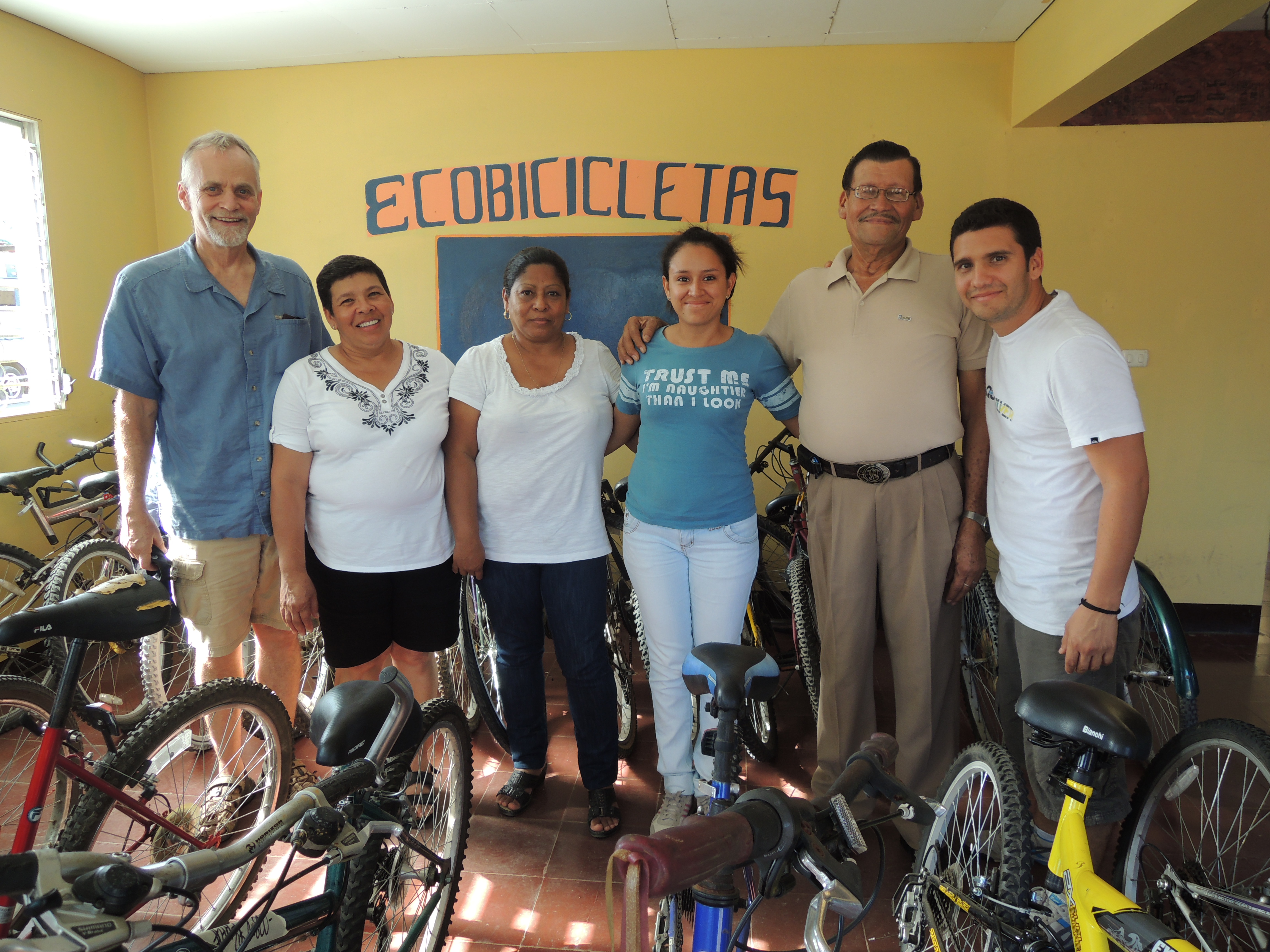
2. ECOBICI, Rivas, Nicaragua
By Wilfredo Santana
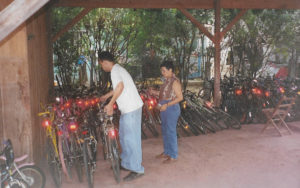
In the 1990s, after the war in Nicaragua, the impact on Rivas of the arrival of bicycles was very great. The country was economically destroyed, public transport was insufficient, and the unemployment rate was high. So for people with scarce resources it was extraordinarily helpful when we started selling bikes at modest prices. We call our bike business EcoBicicletas, EcoBici for short.
Our organization, the Association for the Community Development of Rivas, developed several programs in Rivas and the nearby communities of Veracruz, Buenos Aires, La Chocolata, and Tola. Our programs benefited single mothers, mothers who lost their children or husbands in the war, teachers, and workers. We had programs to build rope pumps for water wells, transport drinking water, build latrines, and build roofs for houses.
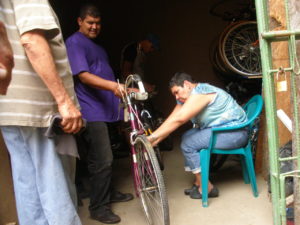 We established bike shops where we sold and repaired bikes and bike parts, and we trained bike mechanics to work in the shops.
We established bike shops where we sold and repaired bikes and bike parts, and we trained bike mechanics to work in the shops.
Rivas has become somewhat more prosperous over the last couple of decades, so the use of motorcycles and autos has increased. We do not have the same demand for bikes that we had years ago, but we still sell many bikes, mostly to young people, women, and some elderly people. And the bicycle is still an economical means of transport for many.
Besides providing affordable transportation to thousands of adults and children in Nicaragua, EcoBicicletas has, for almost three decades, offered steady jobs for the three women who run the organization.
Now, in late 2018, Nicaragua is in the middle of a socio-economic crisis, including violence in the streets. The deterioration of the economy has impacted the sales of bicycles to such a degree that we fear for the survival of our business. We hope that the situation will normalize and the pace of product sales will resume.
President’s Message, Fall 2018
America has always been great!
From September 4, 1776, the first day our Continental Congress met, America has been great. We’ve had our ups and downs, times of great pride, and unfortunately times of shame, but the enduring spirit of the American people continues. We have at times lost our way but have been able to rally back and we will again.
I was raised by a single Mom. We existed on the survivor benefits from my deceased father’s Social Security and Veterans benefits, plus surplus USDA food. While I never truly went hungry, I was often hungry by choice just because of the poor quality of what was offered.
I grew up in southeastern Massachusetts at a time when Kennedy was President and the United States represented that gleaming city on the top of the hill. I was deeply inspired by President Kennedy. He was tremendously admired by all of the population of Massachusetts. He was not a God; he was a man with his good sides and bad and I’m sure the #MeToo Movement would have had trouble accepting him. That side was never made public, at least to children in 1963, but Kennedy inspired us. He dared us to try the impossible and although he was fallible, his efforts changed the course of history.
Even as a youngster I was political. My mother always had us watch the nightly news and would discuss what was going on in the world. We watched every speech Kennedy made. The one that sticks in my mind the most was the one in which he challenged us, “Ask not what your country can do for you, but what you can do for your country”. That has been a core philosophy of my life. The second most memorable thing was when he with his brother-in-law Sargent Shriver started the Peace Corps. Nobody expected it to work, but it has been part of his enduring legacy. Our lives were shit, but I learned that there were other people even worse off. I forced my mother to send an application to the Peace Corps. I didn’t know what I could do but I knew a lot about agriculture and raising animals. We gardened in the summer so food was better then. I had a flock of chickens and sold eggs up and down the street so at least we always had eggs in the house. I had newspaper routes, shoveled snow in the winter and mowed lawns in the summer just to bring in some money so that we could afford better food. I really saw not a lot of hope and I thought if I joined the Peace Corps in a country where people were worse off perhaps I would be better off.
Amazingly a Peace Corps recruiter called up and he explained to me that I was too young, and that I should go to college and learn a skill so that I would be better prepared to work overseas.
A lot of time went by. The Vietnam War came and went. I graduated from college with a relatively useless degree but being in college kept me out of the draft. I started working after college at a carpentry factory but I really still saw no future for myself. In 1977 I remembered my old dream and decided it was time to take the future into my own hands and I joined the Peace Corps.
I remember the plane taking off from Logan Airport in Boston on its way to Miami and thinking to myself, “What did you get yourself into this time?” I served for 2 and a half years in the Amazon basin of Ecuador with the tribe of indigenous American Indians called the Shuar. My job was as a land surveyor to survey the land of the Shuar Federation to give them legal property title from the government of Ecuador. They really didn’t understand it very well since they had lived there for centuries. Why did they need a piece of paper? The answer was that there’s oil and and gold under that land. I’m not sure who gained more by my time in the Peace Corps. I believe it was me. I learned a lot about myself and the world, and I got my compass straight.
Finally in January 1980 my time was up and I needed to go home. In 1980 unemployment was double digits in Massachusetts. There was no worthwhile work. I moved to Long Island because I got offered a job teaching agriculture at a middle school. It was there that I met my wife and got married. Long Island was too congested so we moved to Western New Jersey. I tried teaching agriculture in high school again but I just wanted to get out of school. I’d been in a classroom too long. I fell back on previously learned skills and starting working as a carpenter.
Carpentry was good. I created new living spaces for people but I had a very minimal effect on society. We were successful but I still needed more. Every week on garbage day I would see perfectly good bicycles being thrown out, usually because they were the wrong color or the wrong size. When I was in the Peace Corps living in the town of Sucúa, Morona-Santiago, Ecuador, only one person in town had a bicycle. Everyone else walked everywhere they went all the time. I started thinking about all of these good bicycles being thrown into the trash for no reason and how they could revolutionize Sucúa. That was the impetus to start Pedals for Progress.
When there is a migration of people for economic reasons the people who leave are the best and brightest. That makes it almost impossible for the society the people are leaving to be successful. There had to be a way to help people stay in their own community. The answer was they needed to have hope of a brighter future and a path to get there. From my time in Ecuador I realized that the problem in the developing world was not always a lack of work but rather a way to get to work. The primary goal in starting Pedals for Progress was to give people in the developing world the ability to stay in their hometown with their family and have the hope for a better future. There is no hope for the future without food on the table.
All of Central America cannot move to the United States, just as all of West Africa cannot move to Europe. We just cannot absorb all those people. Therefore it is crucial that we find a way to build these developing societies so those individuals see a path to success. A sad truth of adulthood is that you need to go to work. Children need to go to school. People need to go places to be successful. Yet when I started this organization in 1991 almost half of the world walked everywhere they went. Mankind’s greatest invention, the wheel, had not been introduced into those people’s lives.
By 1993 I quit my job as a carpenter and dedicated myself full-time to collecting as many bicycles I could to help as many communities as I could. I quickly realized that I would not be able to grow Pedals for Progress big enough to be able to meet goals I’ve set for myself. That’s when I decided to publish my business plan and try to get other people to pick up my goals and move them forward. I did not want them to join Pedals for Progress but rather create independent sister organizations in every major city, and every developed country to pursue the goal of introducing the wheel to everybody on the planet. I offered to consult with any of the groups for free to help them get started. There are now over 70 groups in at least a dozen countries collecting bicycles as charitable items and shipping them to developing nations. While Pedals for Progress has shipped a mere 156,000 bicycles, our sister organizations, some of which I am in close contact with and others that I have no contact with, combined have matched our total.
In 1999 we branched out and began collecting sewing machines. While a bicycle allows an adult to go to work, a sewing machine is a job in a box. Shipping bikes was easy because in every town in every country of the world there are mechanics who can fix a bicycle. The bicycle is a product of the 1800s; for the most part they are just not that complicated. On the other hand, if a sewing machine needs repair, it takes a special individual. We started the sewing machine business very slowly because we had to learn not only how to collect them, but how to get them repaired, and we had to learn a new way to ship. We put sewing machines in many of our bicycle containers but there are many programs which we have started around the world that have no interest in bikes and really want just sewing machines. By the time you’re reading this in November we will have shipped close to 5000 sewing machines and I have already recruited one group in the United Kingdom to ship sewing machines to the developing world.
As a famous frog once said, “It ain’t easy being green.” Indeed without the support of my family I could have never been successful. I have won a lot of awards, but I only applied to win the cash prize. My primary goal is to raise money to support this organization and when you win an award they give you money. We get $10 for every bike we collect but it is not enough; the complete cost is close to $50 per bike. It is you, the supporters of Pedals for Progress, who keep P4P continuing on its mission. This year we’ve shipped 34 tons of steel to South America, Central America, Africa, Eastern Europe, and Southeast Asia. If I wanted to make one shipment I could get it donated, but when I made 8 to 10 shipments per year I had to become a customer of the shipping lines and needed to assume those costs.
An even greater cost is the cost of running a trucking company in New Jersey—not only the cost of sending out trucks and picking up bikes but also the added expenses of having an office to manage it all, enough insurance policies to float the Titanic, and all of the rigorous reporting required by the states of New Jersey, New York, Connecticut and the Commonwealth of Pennsylvania. This is an expensive place to be in business and in order to keep those bicycles and sewing machine flowing, we need to raise funds to pay those expenses. Folks, that’s where you come in—we cannot do it without you.
In communities like Rivas, Nicaragua, where we’ve shipped more than 20,000 bicycles, children can get to school and adults can comfortably commute to work and market. In Rivas, America represents Kennedy’s shining city on the top of the hill. The people of Rivas are so deeply appreciative of the aid they have received to allow them to stay in their own hometown, be successful, and have hope for the future, despite the troubled political times in Nicaragua.
We have only one planet to live on, and it is beset with terrible danger due to global warming. We need our neighbors to work together with us to save this planet for all of us. Developing nations know the risks global warming presents. We need to encourage them to move towards bicycle societies for local trips. We need to help them in that effort by supplying them with the ability to be successful at home. We need them as much as they need us. As people go to work they will start buying products and they can become our future customers. The world today is a very small place and we need to work together to keep it safe, to lift children out of poverty, and encourage adults towards gainful employment for the benefit of their family.
Please continue supporting our organization. We are making a positive change in the world. Although we are a drop in a very big bucket, we are doing the best we can. Thank you.

David Schweidenback
Fall 2018: Bike School and Bike Jobs in Tirana, Albania
By the Ecovolis Team
Fall 2018 InGear
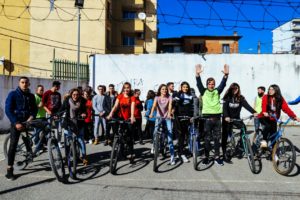
It was a Saturday afternoon when the activists of EcoVolis went out as usual to patrol the new bicycle lanes here in Tirana, Albania. In one lane there was a motorcycle driving fast, in another a car that had completely blocked the bike lane. A total of 12 miles of lanes built in a very short time by the head of PASS/Ecovolis, now titled the “Bike Mayor”. PASS and Pedals for Progress are the right combination to turn Tirana into the City of Bikes.
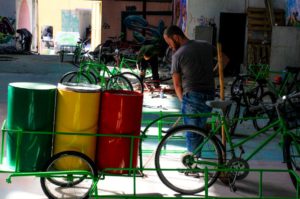 In just a moment we counted over ten bikers using the lanes. It was a rare emotion for the activists who have fought for ten years for protected lanes. Now these lanes are flowing rivers of bikers. Just like boats on true rivers, these bikers go about their days on these lanes.
In just a moment we counted over ten bikers using the lanes. It was a rare emotion for the activists who have fought for ten years for protected lanes. Now these lanes are flowing rivers of bikers. Just like boats on true rivers, these bikers go about their days on these lanes.
We take a look back in time: How did we get here? The collaboration with Pedals for Progress gave the opportunity to PASS, the mother organization of EcoVolis, to undertake tens and hundreds of activities with the mission to return bikes to Tirana. It was the start of this partnership in 2000 that decided how things were going to be for the bikers of Tirana today. And how beautiful things are!
There are daily bikers for the Day Care, Two-wheels Academy, Free the Lanes, weekend biking, tour guides for guests, bikes for kids who cannot afford them, bikes for the elderly and the communities that need them. One great example is the transformation of 30 bikes from P4P into cargo bikes for the Romani community to work in the recycling field (a total of 60 new jobs).
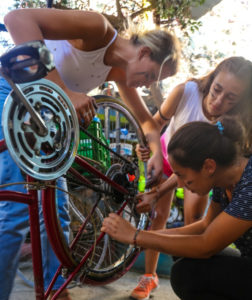
The number of bikers in Tirana has grown tenfold. At the EcoVolis Service shop a lot of bikers come to repair or exchange their bikes for better ones from the U.S.A. This led us to start to train young girls and boys to repair bikes in order to open more EcoVolis Service points and also to create new jobs for more people.
Now that there are more than 7000 bikes from P4P, EcoVolis has another ambitious mission: to open a bike school. Taking as examples other countries where bikes are ubiquitous—the Netherlands and Denmark, for example—Tirana is also at the point in which it is opening the first schools for bikes, with the full support of P4P. This school, now in the planning stages, is expected to add 3000–4000 bikers to the lanes per year.
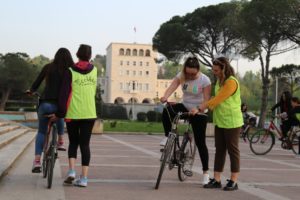 To change movement in a city with over 1 million inhabitants is the story of the success of a strong partnership like the one between U.S.A./P4P and Albania/PASS. When we look back we cannot believe that fate and time approached us with such a virtuous organization, whose support and energy helped us to create so many jobs for the community and to make a two-wheel revolution for our city. Thank you, Pedals For Progress. You are already a Nobel Prize organization.
To change movement in a city with over 1 million inhabitants is the story of the success of a strong partnership like the one between U.S.A./P4P and Albania/PASS. When we look back we cannot believe that fate and time approached us with such a virtuous organization, whose support and energy helped us to create so many jobs for the community and to make a two-wheel revolution for our city. Thank you, Pedals For Progress. You are already a Nobel Prize organization.
Report from Ethiopia, Fall 2018
By Samson Tsegaye
Fall 2018 InStitch
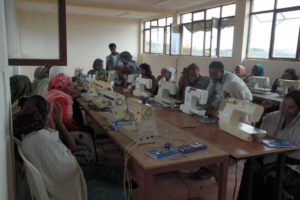
[In July 2017 we shipped 72 sewing machines to our partner in Ethiopia, Stiftung Solarenergie—Solar Energy Foundation. Political and logistical problems slowed the program. But we just got this report from Country Director Samson Tsegaye; the training has begun.]
Dear David,
Finally I managed to start the sewing machine training for 25 women. I am so happy to inform you of this. It was so challenging to get this far.
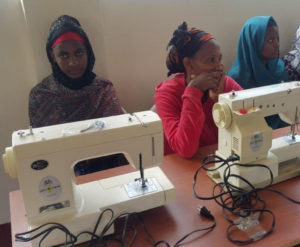 They will have 21 days of training on sewing technique and then they will receive one sewing machine to start their own business.
They will have 21 days of training on sewing technique and then they will receive one sewing machine to start their own business.
Thank you so much again for your great help.
Best Regards
Samson Tsegaye, Ethiopia Country Director
Stiftung Solarenergie—Solar Energy Foundation
Report from Kenya, Fall 2018
By Tom Ademba
Fall 2018 InStitch
[In March 2018 Sewing Peace made its first shipment to Aid the Needy in Homa Bay, located on the eastern shore of Lake Victoria in Western Kenya. The shipment of 72 sewing machines arrived in June. It was funded in part by the William and Helen Mazer Foundation of New Jersey.]
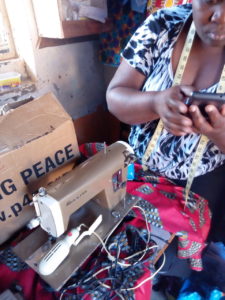
One of the beneficiaries of our first SP project in Kenya is a group called the Maseno Deaf Project. This is an organization of deaf people in Western Kenya running small businesses. They requested Aid The Needy to support them with a few sewing machines. They are making school uniforms, and designing various household garments that they sell to support their families. The group has 36 members working towards economic development.
Another Aid the Needy project is at the Atela Secondary School, where they use sewing machines in their Home Science classes. Atela Secondary School is a rural institution supporting education of young people from the smallholder farming communities in Rachuonyo District, Homa Bay County, Kenya. The school has a Home Science curriculum where sewing machines are a critical part of the syllabus. They now have good machines that support their classes.
Mother Teresia Van Miert, in Oyugis town, is a school run by the Franciscan Sisters supporting education of young children. The School has more than 300 children. By regulation, the school children must have uniforms. With SP sewing machines they are able to produce the uniforms within the school and make them affordable to the parents.
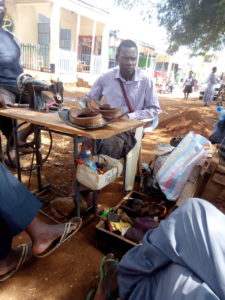 Luke is a cobbler who repairs shoes and bags, including lots of school bags. He also designs footwear from car tires. He does it so well that with only a few tools he earns good money. He purchased one machine that can run both manually and electrically. He operates under a shade tree in Oyugis Town, Homa Bay County, Kenya.
Luke is a cobbler who repairs shoes and bags, including lots of school bags. He also designs footwear from car tires. He does it so well that with only a few tools he earns good money. He purchased one machine that can run both manually and electrically. He operates under a shade tree in Oyugis Town, Homa Bay County, Kenya.
Report from Kosovo, Fall 2018
By Kushtrim Gojani
Fall 2018 InGear
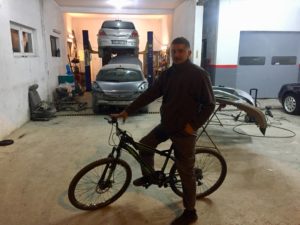
Kujtim Mehmeti is one of the co-owners of an auto-repair shop called “D-Max”. The service is located near Vushtrri, a town about 10 miles from the capital, Prishtina. Owing to his profession, Kujtim inevitably loves wheels and speed. He is very fond of bicycles, too, to the point that he still cannot part with his very first BMX bike—on which he learned to cycle and which he still keeps in the attic of his house.
However, when Kujtim (whose name means souvenir, or a memory) bought a big black and green P4P Huffy bike from the GoBike store on July 16th, he didn’t just buy it for himself. He primarily bought it for the employees of his auto shop, Altin Istrefi and Muhamed Shabani. Up until then, they used to hop in the car for everything. As the shop is located by the main road from Pristina to Vushtrri, they had to use the car whenever they needed to go into town or to a store for supplies or food. They have now replaced the car with the bicycle—and they are loving it! Kujtim hasn’t really crunched the numbers to know how much he is saving on fuel costs by using the bike instead of the car. But the benefits to the environment and to their health are invaluable.
On Sundays, when the shop is closed, Kujtim and his friend Alban Kasumi (who also bought his bike from GoBike) go cycling for 10 miles just to keep fit. Kujtim was the first to buy his bike. Alban bought his the very next day, after spending a sleepless night from the fear that his favorite Kent 700 Roadtech bike might be sold. Both love the effect the bicycles are having on their fitness and general well-being. They can’t wait for Kosovo’s infrastructure to recover to enable people to change—where possible—from cars to bicycles.
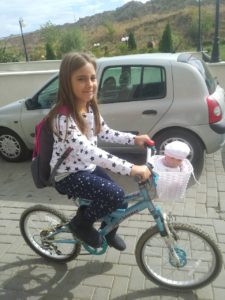 Marjana Neziraj, whom her family and friends call Jana, is 9 years old. She lives in Pristina with her mom Kristina, dad Bruno, and her brother Daniel. Jana loves being outdoors. She thought she liked only swimming during the hot summer months, but after her father bought her the Venus Rock Candy bike on August 1st, from the GoBike store, she discovered how much she misses cycling too. Whilst she was off school during the summer break, she used her bike almost every day. The bike was a tool for Jana and her favorite doll of more than 7 years, Beba Trashe, to go for a ride around the neighborhood, or to go to visit her grandfather, aunts, and uncles. Now that school has started, her father often takes the bike to school when he goes to collect her. Jana then rides home, under the guidance of her father, as Pristina is not yet a cycling friendly city for adults, let alone children. Jana’s one regret is that her father works very hard and does not have time to go riding bicycles with her in Germia Park, just on the outskirts of the capital city. However, she is determined to carry on cycling, on her own if needs be. She is a very determined girl, and the bike is not only helping her with mobility, but also to learn to be independent.
Marjana Neziraj, whom her family and friends call Jana, is 9 years old. She lives in Pristina with her mom Kristina, dad Bruno, and her brother Daniel. Jana loves being outdoors. She thought she liked only swimming during the hot summer months, but after her father bought her the Venus Rock Candy bike on August 1st, from the GoBike store, she discovered how much she misses cycling too. Whilst she was off school during the summer break, she used her bike almost every day. The bike was a tool for Jana and her favorite doll of more than 7 years, Beba Trashe, to go for a ride around the neighborhood, or to go to visit her grandfather, aunts, and uncles. Now that school has started, her father often takes the bike to school when he goes to collect her. Jana then rides home, under the guidance of her father, as Pristina is not yet a cycling friendly city for adults, let alone children. Jana’s one regret is that her father works very hard and does not have time to go riding bicycles with her in Germia Park, just on the outskirts of the capital city. However, she is determined to carry on cycling, on her own if needs be. She is a very determined girl, and the bike is not only helping her with mobility, but also to learn to be independent.
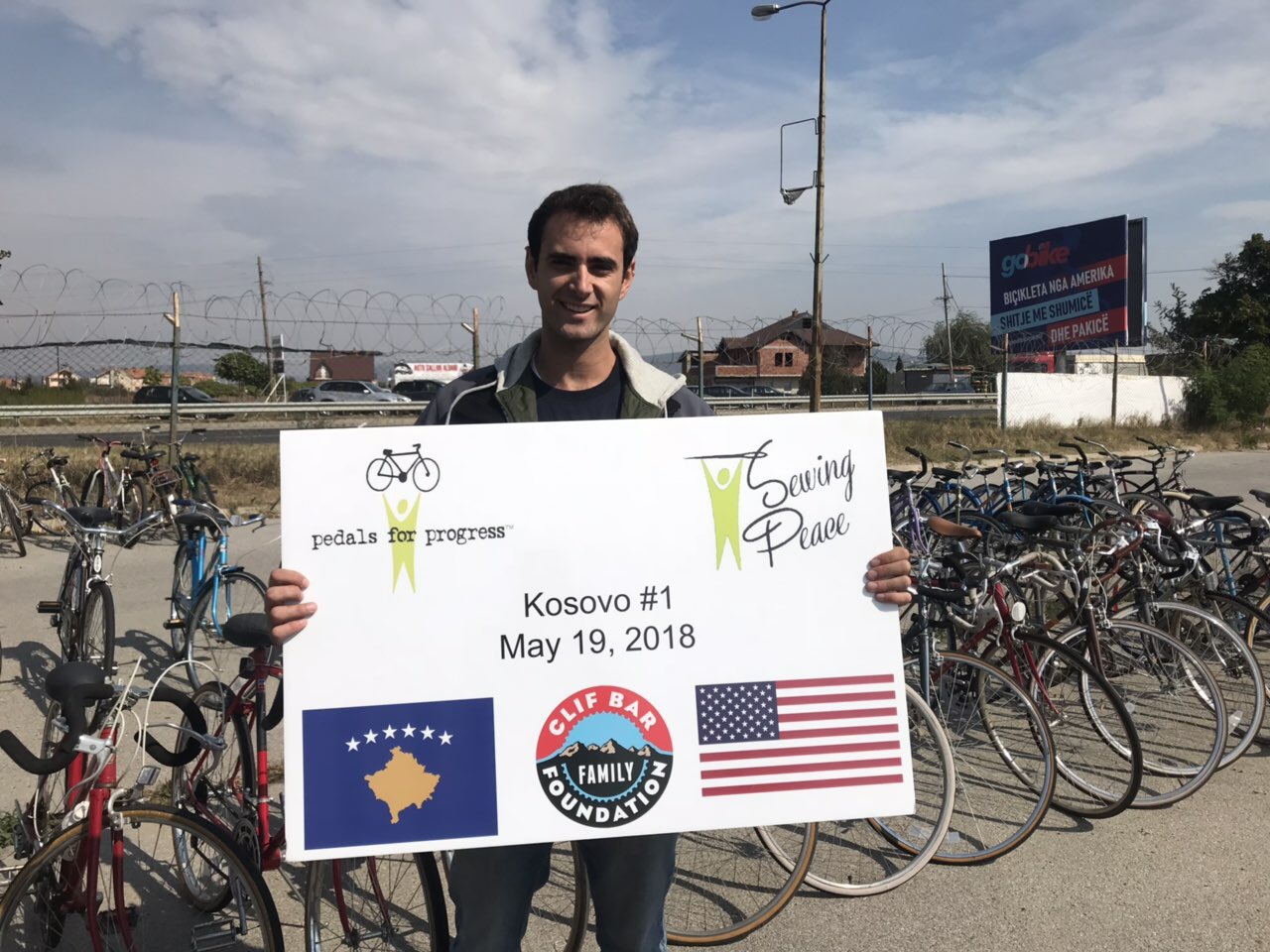
Fall 2018: New Partner in Tanzania: the Matabaiki Olere Organization
By Giza Mdoe
Fall 2018 InGear/InStitch
[In October 2018, P4P shipped a container with 469 bikes and 119 sewing machines to our new partner in Tanzania, the Matabaiki Olere Organization. Giza Mdoe is our contact there. Here he introduces himself, his region, and his plans for two projects: one with sewing machines and one with bikes.]
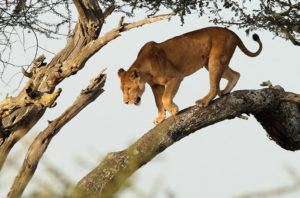
The Matabaiki Olere Organization is based in the town of Arusha, Tanzania. Arusha is a tourist hub, 60 miles from Kilimanjaro, the highest mountain in Africa, and 100 miles from the Serengeti Plains and the Ngorongoro Crater, the world’s largest caldera, home to the world’s only tree-climbing lions. The Ngorongoro Conservation Area also contains the Olduvai Gorge, one of the most important paleoanthropological sites in the world.
I grew up in Kenya, where I was raised by a foster family. They live in Boston now.
Sewing-machine Project: Fabrics of Society (FOST)
Fabrics of Society (FOST) is a project for training single mothers in sewing, tailoring, design, and marketing.
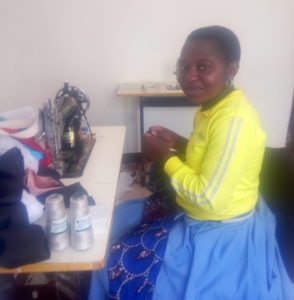
The sewing machines will all go into a production line for various items to be sold in country and exported, including to the U.S. At the moment I enroll school drop-outs who are single mothers. We have five sewing machines and the women make sandals as well as clothes. In this country when a girl gets pregnant in school she is expelled and is not allowed back into school even after her child is born, worsening the cycle of poverty.
The girls learn to use the machines free of charge. They take a percentage of the sales. We donate books and supplies to local schools where our girls give testimonials to help with awareness.
Depending on availability of sewing machines and trainers, FOST aims to enroll 180 women in the training program and 20 tailors (who have previous experience). We will hire 2 teachers and 3 training assistants.
The trainees will attend 3-hour classes 3 times a week. The training is done in 4 stages, each lasting 3 months with each stage marking a specific level of proficiency. A small enrolment fee is charged to give the members a sense of responsibility and ownership.
The initiative is done in partnership with VETA, the Tanzanian Vocational Education and Training Authority, who will issue certificates of achievements to the graduates. The project will start in Dar es Salaam and then move to other regions.
Besides technical training in tailoring, the initiative provides basic life skills in health, nutrition and sanitation. Focus is family planning as well as the importance of pre- and post-natal clinics, breastfeeding, balanced diets and personal hygiene.
Bicycle Project: Watu wa Delivery (WWD)
Watu wa Delivery (WWD) is Swahili for “delivery people”. It is designed to create employment for impoverished youth in urban areas. Employees will use bicycles to deliver food to urban residential areas and mail to commercial centers.
I expect to put at least 200 bikes into the delivery business project and sell the rest to raise the U.S. $6000 for our next shipment. Since I have never done such a project before I don’t know how long it will take but am assuming a couple of months.
The program will begin in Mbeya, which has a large population of urban unemployed youth.
The initiative will hire a delivery crew of 1500 and a dispatch and maintenance crew of 500. We will establish 50 Dispatch Centres. Each Dispatch Centre will have 10 bikes and each bike will be assigned between 2 and 3 delivery persons to work half- and full-day shifts according to their availability.
WWD will also establish telecom, internet, and networking services. Examples of these services are low-cost mobile calls and texts, marketing for sellers, a mobile app and a WWD website for buying, selling, and customer rating of sellers.
Besides job-specific activities, WWD will conduct monthly outreach programs for youth providing education on sexual health, drug abuse, youth rights, hygiene, health and nutrition, environment, vocational training and accelerated learning options.
2018 Success Story from Uganda: Agnes Nakabuye
By Mathew Yawe
Fall 2018 InStitch
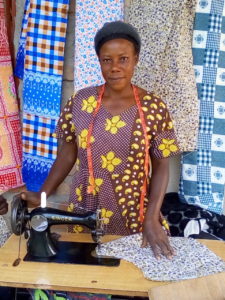
Agnes Nakabuye is a 38-year-old widow and single mother of 4. Our vocational project sponsored her 2 years of training in sewing, tailoring, and fashion design. At the end of her 2-year course, the project gave her at no cost a manual Singer sewing machine from Sewing Peace.
For her business, Agnes hired a space on the veranda in our town of Mityana for U.S. $5.40 per month. She earns daily U.S. $2 to $4 selling second-hand clothes, fitting and repairing clothes, and making school uniforms.
Agnes has managed to save money for renting the room where her family lives, for buying food and medication, and for paying school fees for three of her children. Her first-born is 18 years old in senior six; her second-born is 15 years old in senior four; her third-born is 13 years old in senior one; and the last born, 9 years old, dropped out of school in primary six because Agnes could not afford the school fees.
Agnes has several challenges, and several hopes and dreams for the future.
- She would like to expand her business, so she would like to be able to afford more material for her tailoring.
- She would like to be able to afford a better sewing machine: one that can work on tougher fabrics and that has overlocking capability.
- She would like to be able to rent a shop where she can safely store her customers’ clothes and her sewing machine. As of now, every day she must carry the machine and her materials between her room and her space on the veranda!
- Ideally, she would like to be able to afford her own property, where she could build a house, grow food, and start a poultry-farming project.
Besides running our training programs, the Mityana Open Troop Foundation has also set up a sewing-machine shop in Mityana Town where schools and tailors can buy high-quality sewing machines at reasonable prices. The profits from the shop help pay our instructors and shipping costs.
We extend our sincere thanks to Sewing Peace for providing the machines that we use in our training programs, that we provide to our graduates in starting their own businesses, and that we sell in our shop to make our organization successful.
Uganda: Mityana Open Troop Foundation Graduation, 18 November 2018
By Mathew Yawe, Executive Director, Mityana Open Troop Foundation
Fall 2018 InStitch
The Mityana Open Troop Foundation held this year’s graduation on 18 November 2018. Robinson Nsumba Lyazzi, the director of Basic Education, Uganda Ministry of Education, presided over the graduation and commissioned 71 graduates:
- 28 in sewing/tailoring
- 40 in hair dressing & weaving
- 3 in motor vehicle mechanics
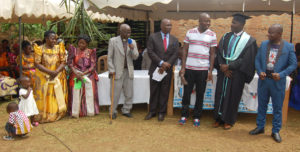
All graduates were awarded certificates and each sewing graduate was given a nice sewing machine from Sewing Peace U.S.A. The function was witnessed by over 600 guests, trainee parents, and government officials.
Achievements:
- Conducted the 7th Project Graduation Ceremony and commissioned 71 trainees.
- Completed the construction of the Girls dormitories / hostels, with funds from selling some of the sewing machines from Sewing Peace U.S.A.
- Opened a shop in our town, where we are selling sewing machines and bikes from Pedals for Progress / Sewing Peace U.S.A.
- Started this year training Agriculture lessons, at our project.
- The Sewing department is well equipped with sewing machines from Sewing Peace. We experience mechanical problems every day, as learners operate the machines the other way round! But we call the servicing man to repair them, and we are trying to train our youths to fix them when problems arise.
Challenges:
- Insufficient classrooms at the vocational project! The one existing room (10 ft by 20 ft) can’t accommodate the large number of trainees. Some trainees in the tailoring/sewing class study under tree shelters, while the hair dressers study in the outdoor shelter, where they get soaked when it rains, as there is nowhere to go!!!
- It is still a challenge to raise shipping costs and pay customs charges for the sewing machines from Sewing Peace. That’s why we have to sell some of them to the communities to enable us cover the shipping costs and customs charges.
- The project shop where we sell our sewing machines and other sewing services lacks an embroidery machine that can design school badges and name tags. In our district, including the surrounding 6 district, there is no embroidery machine, yet there are many schools that have to travel over 80km to Kampala in search of embroidering services.
- Many thanks goes to Mr. David Schweidenback, Pedals For Progress / Sewing Peace, and all its donors, for sending sewing machines of high quality. These machines have allowed us to have one machine per student for hands-on training in our sewing workshop, whereas previously we had one machine per 5 students. Furthermore, the donated sewing machines have supported project activities, such as paying some teachers, completing the construction of a girls’ hostel, and start-up tools for the project graduates. Please, Long Live Pedals For Progress / Sewing Peace.
- We extend our thanks always to Mr. Christopher James Eldridge, who supports a number of activities at our project.
- We thank the Government of Uganda, Ministry of Education & Sports, for having sponsored some disadvantaged youths in our programs.
- Thanks go to Kolping Mityana Women’s project, Namutamba Child Development Program, and Fields of Life for sending orphans and vulnerable children to our vocational project.
Way Forward:
- Constructing at least 2 classroom block, to accommodate more trainees, and to store tools.
- Acquiring an embroidering machine, which can help generate income towards sustaining project activities.
- Starting poultry farming, as chickens are rare and expensive in Uganda, yet need little space and produce profits quickly. We are also looking forward to introducing a chick hatchery machine to supply the 7 surrounding districts.
In conclusion, I especially thank very much Pedals For Progress, who made this year’s Vocational Graduation Ceremony colorful, by having donated many nice sewing machines, which we gave to the graduates. We extend thanks to all U.S. donors and volunteers involved in donating and refurbishing the sewing machines. Our trainees use the machines to generate income for food, housing, and medical care. These machines offer a new life and a better future for our trainees and their families.
Finally, I thank all those who have supported the Mityana Open Troop activities this year, especially Mr. Christopher James Eldridge, the Government of Uganda, and charities sponsoring orphans at our project.
God Bless You All.
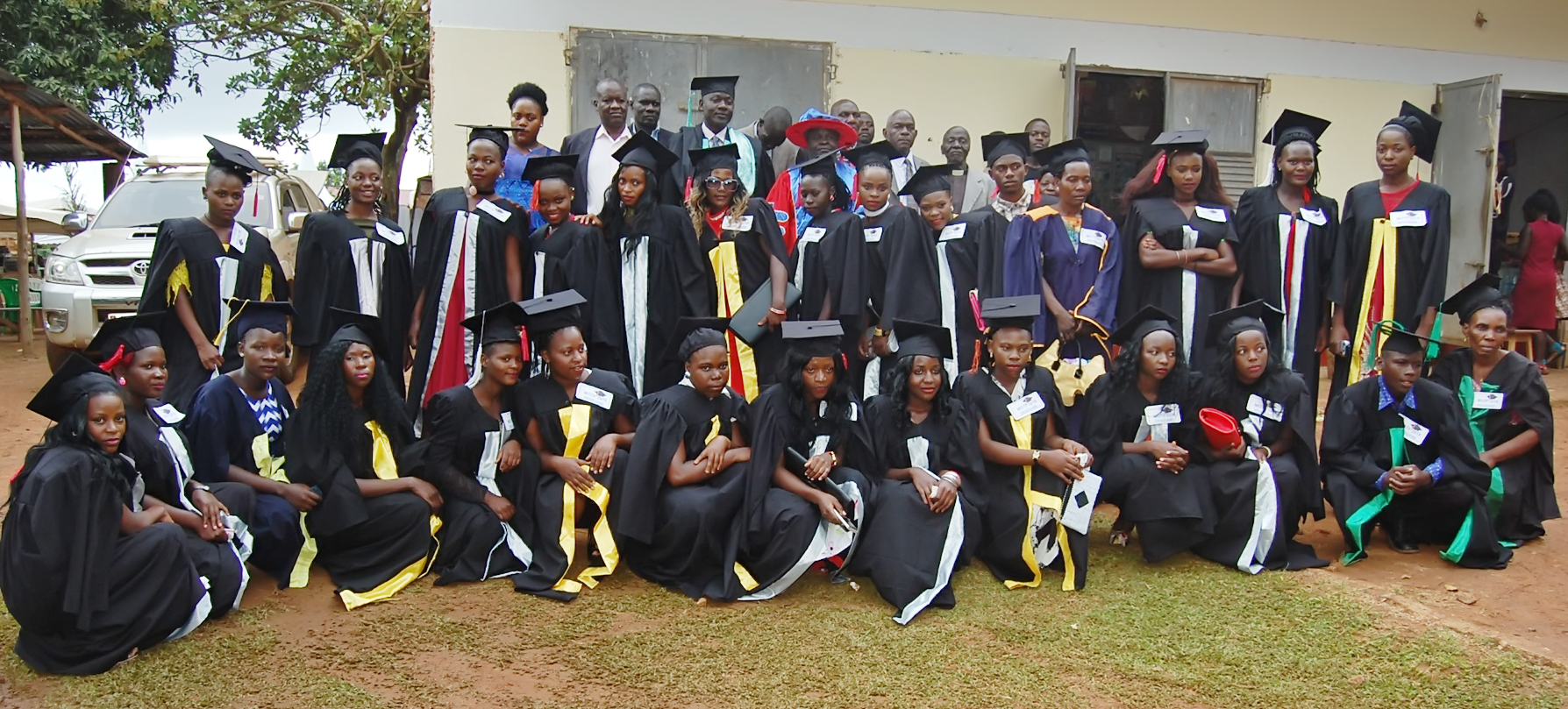
Report from Vietnam, Fall 2018
By Nguyen Hanh
Fall 2018 InGear
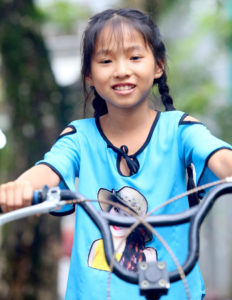
Nhi Cao, 10 years old, was born into a poor family with five children in a village in the Mekong Delta of Vietnam. The family lives in a dilapidated house that was built in 2008 with the help of generous donors. Her father, 48 years old, has been working in construction for more than ten years, and can make only irregular visits home from his far-away construction sites. Her mother, 42 years old, earns income for the family with all kinds of work, including selling lottery tickets. Though she is the youngest child, Nhi helps her mother with the house work, and earns a little income by knitting, feeding chickens, and harvesting vegetables after school.
Two of Nhi’s sisters are already out of school after they completed their secondary education, but are still struggling with finding vocational training programs. Most of the time, Nhi and her sister and brother walked more than 2 miles to school while her mother also walked around 25 miles per day selling lottery tickets, earning $10–$15. Nhi’s mom usually works from dawn to dusk but is still unable to meet the family’s expenses. In early 2018 the mother was provided with a micro-loan from The Dariu Foundation (TDF) to invest in raising 100 chickens with the hope of earning some profit and enabling her to afford a new bike by the end of the year.
In June 2018, The Dariu Foundation received a container of bikes from Pedals for Progress (P4P) and Nhi was among the eligible recipients. After TDF refurbished the bike, they sold it to Nhi in June 2018. TDF also used some spare parts from the P4P container to fix Nhi’s old bike.
Nhi and her brother share the P4P bike to ride to school in the morning. The third child uses the repaired bike to ride to school in the afternoon. Nhi’s mother uses the old bike in the morning and the P4P bike in the afternoon, and as a result has nearly doubled her income from her lottery ticket sales.
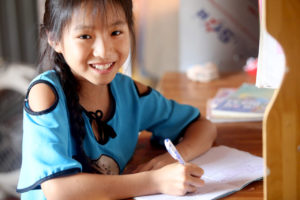 At the end of August, her mother got a second loan of $400 from Dariu, which, together with the profit of $230 from selling the chickens, she invested in raising a cow. She expects that she could earn $800 from this business by end of 2019, along with an annual profit of around $2,400 from selling lottery tickets. This money should help her repair the house and invest in her children’s education.
At the end of August, her mother got a second loan of $400 from Dariu, which, together with the profit of $230 from selling the chickens, she invested in raising a cow. She expects that she could earn $800 from this business by end of 2019, along with an annual profit of around $2,400 from selling lottery tickets. This money should help her repair the house and invest in her children’s education.
In July 2018, Nhi joined Dariu’s coding skill training program (Scratch) for secondary students. She completed a project at the end of the training course, and entered her project in Dariu’s competition among primary students. Unexpectedly, Nhi was among the top ten project winners of Dariu Scratch Summer Camp 2018.
Nhi studies hard and is one of the best students in the class. “Thank you Dariu for giving me such a beautiful and good bicycle. It not only helps me to ride to school but also my mom in her business,” said Nhi. Her mother explained, “I don’t have to use the broken old bike all the time. I am very grateful. I hope in the future my children can continue their education and that Nhi can achieve her dream of becoming a doctor”.
Report from Vermont, Fall 2018
By Joanne Heidkamp
Fall 2018 InGear/InStitch
[The partnership between the Green Mountain Returned Peace Corps Volunteers and P4P goes waaaaay back. They started their P4P collections in 1999. Twelve years later, they wrote this Recipe for Collecting Bikes. In 2014, they collected their 3000th bike. Now, in fall 2018, they sent us another truckload of bikes and sewing machines. Here’s the report.]
Hi David and Lori:
Our 2018 collection on Saturday September 29th was successful. We loaded 193 bikes and 75 sewing machines into 4 FedEx containers.
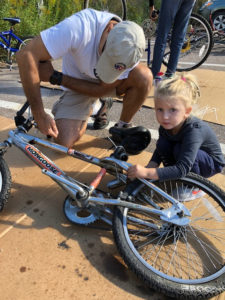
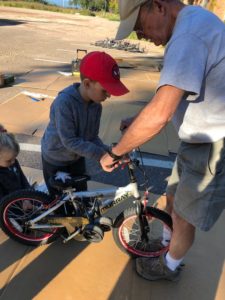 The two miniature bike mechanics Noah (age 5) and Melek (age 3) arrived at 8:30 a.m. to donate Noah’s outgrown bike. They stayed on, with their parents, until we closed up the truck at 1:30. They never stopped working. They strapped pedals to the frames, they greeted people bringing bikes and sewing machines, and they looked everyone straight in the eye and said, “Will you be donating $10 for shipping by check or with cash?” Quite a few people ended up donating extra.
The two miniature bike mechanics Noah (age 5) and Melek (age 3) arrived at 8:30 a.m. to donate Noah’s outgrown bike. They stayed on, with their parents, until we closed up the truck at 1:30. They never stopped working. They strapped pedals to the frames, they greeted people bringing bikes and sewing machines, and they looked everyone straight in the eye and said, “Will you be donating $10 for shipping by check or with cash?” Quite a few people ended up donating extra.
Unfortunately, the quality of bikes is down this year. About 100 of the bikes came from some rural churches that held mini-collections—even after we eliminated the bikes with obvious rust, there are still quite a few marginal bikes in the load.
We are also feeling the impact of Old Spokes Home, a local bike shop plus non-profit that has expanded considerably in the past couple of years. They hold several big collections a year. At this point they are probably skimming 500–800 high-quality bikes a year from the local donation pool. It’s hard for us to compete with their impressive local accomplishments in providing transportation and skills to local teens, refugees, people who can’t drive or don’t have cars, guys on parole, etc. It’s an excellent project. They have donated bikes to P4P when they have a surplus. They get bikes from college campuses in the spring, and from local police departments—both are sources we can not tap into because we don’t have storage, and we don’t want to have to fundraise the $10 per bike.
We also loaded 4 cases of brand new bicycle seats donated by Terry Bicycles, a women-focused bike clothing and accessories company located in Burlington. Our contact at Terry is Colin Sturgess, the operations manager. Colin was the manager at FedEx who first provided us free shipping to New Jersey, back around 2000. He saw our truck in the KMart parking lot last year and left a note sending good wishes. We followed up, and this year he invited us to do outreach at Terry’s annual tent sale in August, and made the offer of donated bike seats as well.
The quality of the sewing machines is up. Half of the machines were collected by Mary O’Brien in Springfield, who checks each one carefully before turning them over to us. The other half came in on Saturday—a lot of nice 1980s portables in their own cases, as well as several Bernina overlock sergers, which are fantastic for sewing knits. We also loaded a 1930s Singer with a knee controller.
Mary O’Brien works in solid waste management for the Southern Windsor County Regional Planning Commission, southeast of Burlington. She has been collecting sewing machines for us since 2014. This year she collected 36 machines that she had individually tested. The solid waste district covers the $10 per item. We are in awe of her!
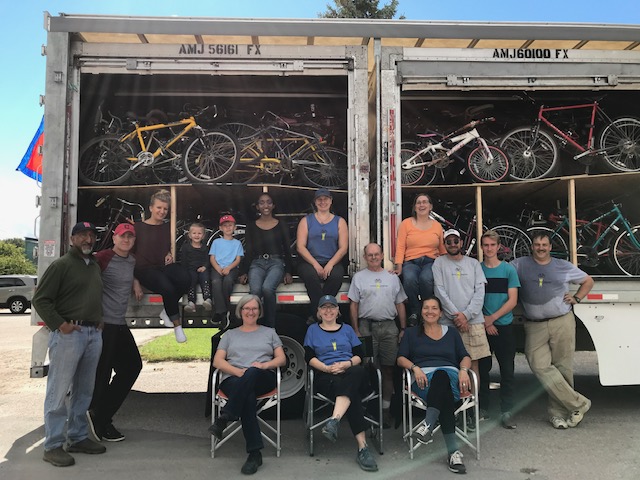
Postscript to the 2018 GMRPCVs FedEx Shipment
On October 16, 2018, the FedEx truck from the Green Mountain Returned Peace Corps Volunteers got to the P4P trailers in Glen Gardner, New Jersey.
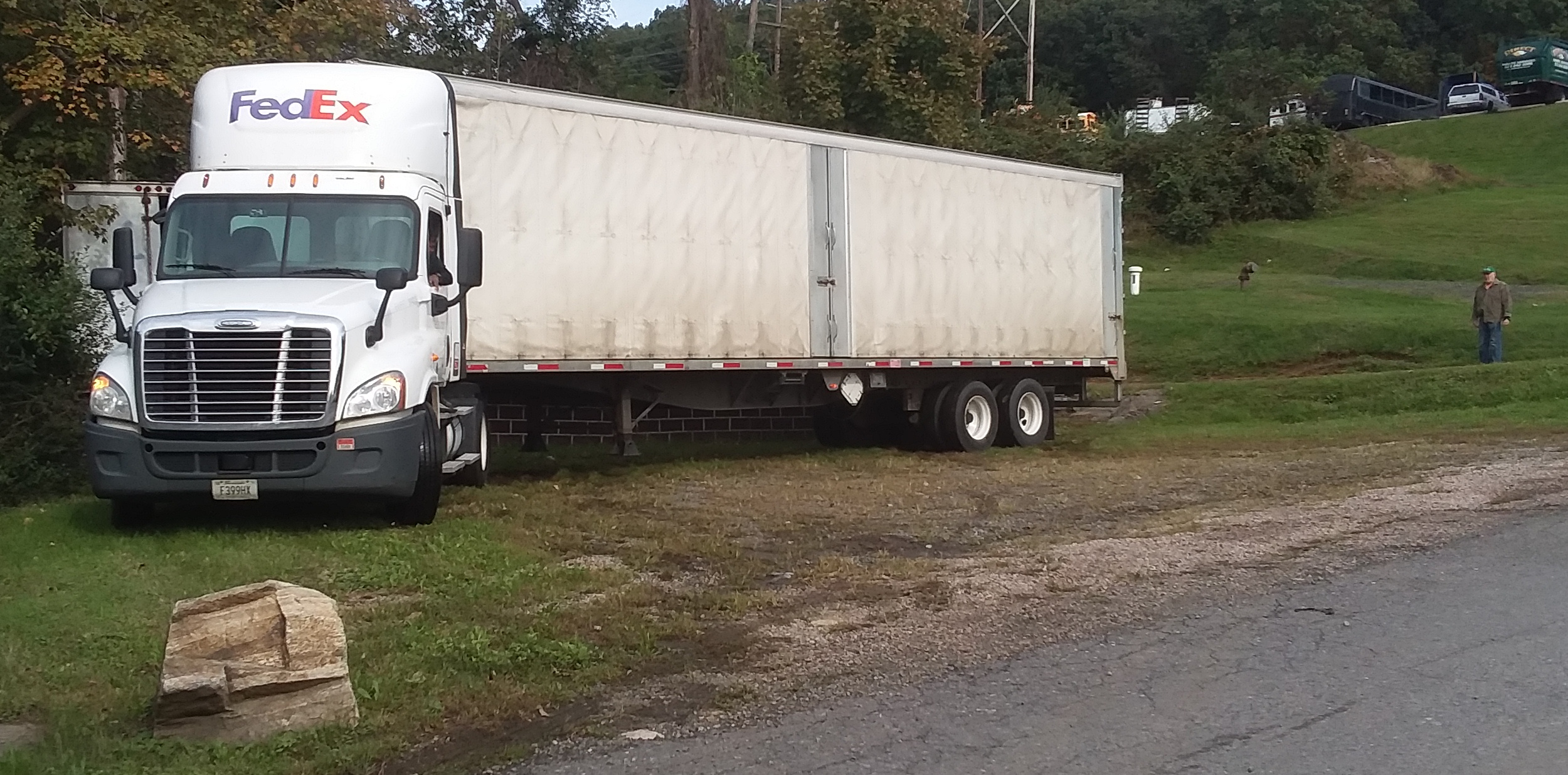
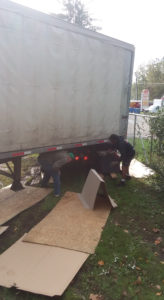
We had our regular driver and he is highly skilled. We were perfectly happy with his first try to park the truck next to our loading dock, but he was not. He wanted to be closer the dock to make the unloading easier.
When he tried to get closer, though, he got stuck in a hidden low muddy spot in front of the trailers—wheels spinning, mud flying, truck not moving. I was sure that getting the stuck tractor-trailer out would be a huge problem.
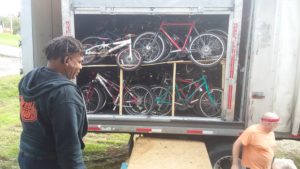
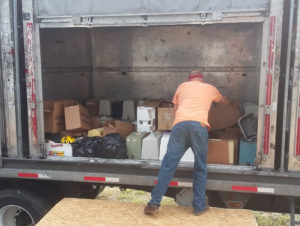 In the meantime, we unloaded the 4 FedEx canisters: 193 bikes and 75 sewing machines.
In the meantime, we unloaded the 4 FedEx canisters: 193 bikes and 75 sewing machines.
The driver called a local towing company and the biggest tow truck I have ever seen showed up. The two drivers chatted amiably for a few minutes. Then the tow-truck driver hooked up a cable to the FedEx truck, flipped a lever on the tow track, and winched the FedEx truck to the asphalt in about 15 seconds. The tow truck never moved. What problem?

Our Partners
P4P/SP Active Partnerships as of November 2018 (  Map)
Map)
ALBANIA, Tirana, PASS, community development: 6,902 bikes (2010 – 2019), 306 sewing machines (2010 – 2019)
CAMEROON, Buea, United Action for Children, youth development: 462 bicycles (2018), 100 sewing machines (2018)
GUATEMALA, Chimaltenango, Fundacion Integral de Desarrollo Sostenible y Medio Ambiente (FIDESMA), small-business promotion: 9,409 bikes (1999 – 2017), 274 sewing machines (2003 – 2017)
KENYA, Homa Bay, Aid the Needy, community development: 72 sewing machines (2018)
KOSOVO, Kastriot, GoBike, community development: 450 bikes (2018), 50 sewing machines (2018)
PERÚ, Ucayali region, Alianza Arkana, community development, 65 sewing machines (2018)
TANZANIA, Arusha, Matabaiki Loere Organization (MATOLO), community development, 469 bikes (2018), 119 sewing machines (2018)
UGANDA, Mityana, Mityana Open Troop Foundation, community development: 137 sewing machines (2017)
UGANDA, Iganga, Office of the Mayor, community development: 69 sewing machines (2018)
VIETNAM, Can Tho City, Dariu Foundation, community development, 528 bikes (2018)
Financial Sponsors
A SPECIAL THANKS TO OUR SPONSORS AND MAJOR CONTRIBUTORS:
John Alexander & Jane Divinski
AXA Foundation
Chad & Cecilia Bardone
Biovid
Blessed Sacrament Catholic Church
Sherman Carll
Uta Dreher
Mrs. Diane Claerbout and Professor Jon Claerbout
Clif Bar Family Foundation
Dariu Foundation
ExxonMobil Foundation
FedEx
Pamela Hanlon Charitable Fund
Jack & Donna Haughn
Robert & Laura Hockett
Leo & Helen Hollein
Gitta & Neil Hosenball
Elliott & Kathleen Jones
Gary & Mary Kamplain
Loughlin Family Foundation
Dorothy Magers
Helen & William Mazer Foundation
David Schweidenback & Geraldine Taiani
South Brunswick Education Association
Ronald Subber & Martha Wood
Thomas & Nancy Tarbutton
Wais Family Fund
Andrew & Emily Williams
Kermit Leslie Young, Jr.
P4P Board of Trustees
John Alexander, Treasurer
Unit 3230, Box 470
DPO, AA 34031 – 0470
David Schweidenback, President & CEO
86 E Main St
High Bridge, NJ 08829
John Strachan
95 Old York Rd
Hopewell, PA 18938
Andrew Williams
642 Jersey Av Apt 3
Jersey City, NJ 07303
Robert Zeh, Secretary
5 Woods Edge Ct
Clinton, NJ 08809
P4P Staff Directory
Dave Schweidenback – Founder and CEO
Gary Michel – VP and Collection Co-ordinator
Lori Smith – Office Manager
Michael Sabrio – Webmaster

